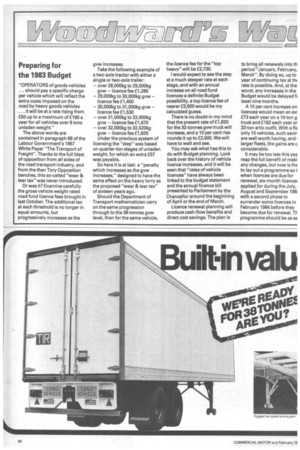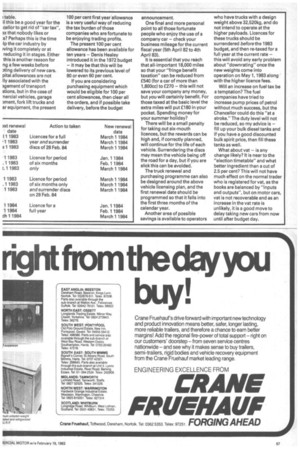Preparing for the 1983 Budget
Page 68

Page 69

If you've noticed an error in this article please click here to report it so we can fix it.
"OPERATORS of goods vehicles ... should pay a specific charge per vehicle which will reflect the extra costs imposed on the road by heavy goods vehicles . . . it will be at a rate rising from £50 up to a maximum of £190 a year for all vehicles over 8 tons unladen weight."
The above words are contained in paragraph 68 of the Labour Government's 1967 White Paper "The Transport of Freight". Thanks to the full blast of opposition from all sides of the road transport industry, and from the then Tory Opposition benches, this so-called "wear & tear tax" was never introduced. Or was it? Examine carefully the gross vehicle weight rated road fund licence fees brought in last October. The additional tax at each threshold is no longer in equal amounts, but progressively increases as the gvw increases.
Take the following example of a two-axle tractor with either a single or two-axle trailer: — over 28,000kg to 29,000kg gvw — licence fee £1,280 — 29,000kg to 30,000kg gvw — licence fee £1,400 — 30,000kg to 31,000kg gvw — licence fee £1,530 — over 31,000kg to 32,000kg gvw — licence fee £1,670 — over 32,000kg to 32,520kg gvw — licence fee £1,820 Under the previous system of licensing the "step" was based on quarter-ton stages of unladen weight, for which an extra £57 was payable.
So here it is at last: a "penalty which increases as the gvw increases," designed to have the same effect on the heavy lorry as the proposed "wear & tear tax" of sixteen years ago.
Should the Department of Transport mathematician carry on the same progression through to the 38-tonnes gvw level, then for the same vehicle, the licence fee for the "top heavy" will be £2,730.
I would expect to see the step at a much steeper rate at each stage, and with an annual increase on all road fund licences a definite Budget possibility, a top licence fee of nearer £3,500 would be my calculated guess.
There is no doubt in my mind that the present rate of £1,820 for the 32-tonnes gvw truck will increase, and a 10 per cent rise rounds it up to £2,000. We will have to wait and see.
You may ask what has this to do with Budget planning. Look back over the history of vehicle licence increases, and it will be seen that "rates of vehicle licences" have always been linked to the budget statement and the annual finance bill presented to Parliament by the Chancellor around the beginning of April or the end of March.
Licence renewal planning will produce cash-flow benefits and direct cost savings. The plan is to bring all renewals into th period "January, February, March". By doing so, up to year of continuing tax at thf rate is possible. And, at the worst, any increases in the Budget would be delayed fi least nine months.
A 10 per cent increase on licences would mean an exi £73 each year on a 16-ton g truck and £182 each year or 32-ton artic outfit. With a fie only 10 vehicles, such savin are well worth having, and larger fleets, the gains are q considerable.
It may be too late this yea reap the full benefit of maki any changes, but now is the to lay out a programme so t when licences are due for renewal, six-month licence: applied for during the July, August and September 198: with a second phase to surrender some licences in February 1984 before they become due for renewal. Th programme should be as se :table.
II this be a good year for the cellor to get rid of "car tax", 3x that nobody likes or s? Perhaps this is the time lp the car industry by wing it corn pletely or at reducing it in stages. Either this is another reason for ng a few weeks before pting delivery of new cars, pital allowances are not Ily associated with the 3gement of transport 3tions, but in the case of nercial vehicles, garage )ment, fork lift trucks and ar equipment, the present 100 per cent first year allowance is a very useful way of reducing the tax burden of those companies who are fortunate to be enjoying trading profits.
The present 100 per cent allowance has been available for ten years — Denis Healey introduced it in the 1972 budget — it may be that this will be lowered to its previous level of 80 or even 60 per cent.
If you are considering purchasing equipment which would be eligible for 100 per cent allowances, then clear all the orders, and if possible take delivery, before the budget announcement.
One final and more personal point to all those fortunate people who enjoy the use of a company car — check your business mileage for the current fiscal year (5th April 82 to 4th April 83). Ills essential that you reach that all-important 18,000 miles so that your "fringe benefit taxation" can be reduced from £540 (for a car of more than 1,800cc) to £270 — this will not save your company any money, but you will certainly benefit. For those taxed at the basic level the extra miles will put £180 in your pocket. Spending money for your summer holiday?
There will be a small penalty for taking out six-mouth licences, but the rewards can be high and, if correctly planned, will continue for the life of each vehicle. Surrendering the discs may mean the vehicle being off the road for a day, but if you are slick this can be avoided.
The truck renewal and purchasing programme can also be designed around the above vehicle licensing plan, and the first renewal date should be programmed so that it falls into the first three months of the calendar year.
Another area of possible savings is available to operators who have trucks with a design weight above 32,520kg, and do not intend to operate at the higher payloads. Licences for these trucks should be surrendered before the 1983 budget, and then re-taxed for a full year at the current rate — this will avoid any early problem about "down rating" once the new weights come into operation on May 1, 1983 along with the higher licence fees.
Will an increase on fuel tax be a temptation? The fuel companies have tried to increase pump prices of petrol without much success, but the Chancellor could do this "at a stroke." The duty level will not be reduced, so my advice is — fill up your bulk diesel tanks and if you have a good discounted bulk spirit price, then fill these tanks as well.
What about vat — is any change likely? It is near to the "election timetable" and what better ingredient than a cut of 2.5 per cent? This will not have much effect on the normal trader who is registered for vat, as the books are balanced by "inputs and outputs", but on motor cars, vat is not recoverable and as an increase in the vat rate is unlikely, it is a good move to delay taking new cars from now until after budget day.








































































































